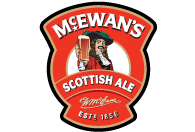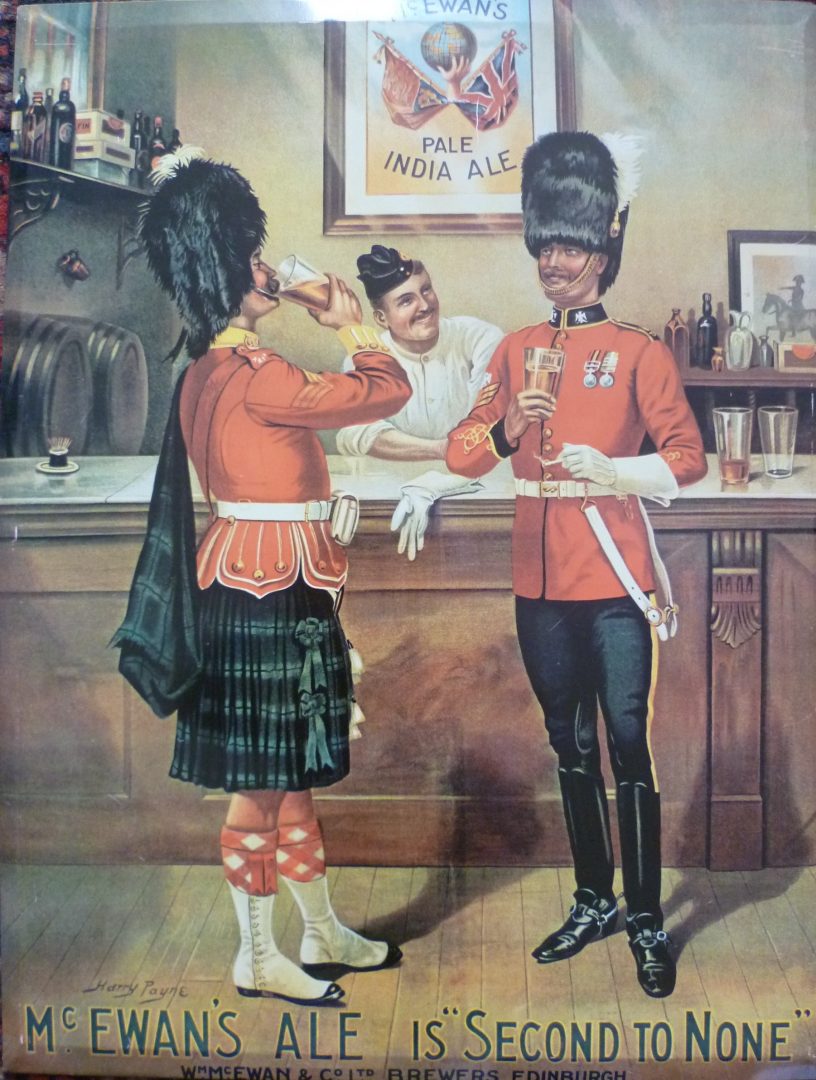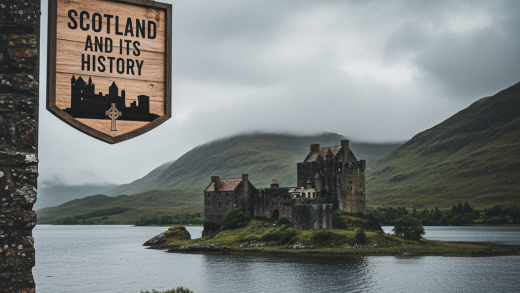McEwan’s is a brand of beer owned by Carlsberg Marston’s Brewing Company. It was originally brewed by William McEwan’s Fountain Brewery in Edinburgh, Scotland. The McEwan’s brand passed to Heineken in 2008 after their purchase of Scottish & Newcastle’s British operations. Heineken sold the brand to Wells & Young’s in 2011, who sold their brewing operation, including the McEwan brand to Marston’s in 2017. Cans and bottles are now brewed in Bedford, England.

company’s reputation, was first labelled Export.
History
William McEwan opened the Fountain Brewery in Fountainbridge, Edinburgh, in 1856. The firm underwent several mergers in the following century, including with local rival William Younger’s, and later with Newcastle Breweries to form Scottish & Newcastle. Its popular brands included 80/-, a Heavy beer, and Export, an India Pale Ale. All of the draught beers (except Best Scotch) were brewed at the Caledonian Brewery in Edinburgh, whilst the canned and bottled beers were produced at the Eagle Brewery in Bedford, England. The beers are sold predominantly in Scotland and the North East of England.
Despite being the dominant presence in Scottish brewing for around a century, the McEwan’s brands were neglected by Scottish & Newcastle, who concentrated on their global brands.[citation needed] The McEwan’s ales were eclipsed by John Smith’s Bitter and Belhaven Best and cask-conditioned beers such as Deuchars IPA, whilst the lager fell behind Tennent’s.
McEwan’s used a cavalier mascot, broadly based on the Frans Hals painting, the Laughing Cavalier portrait[citation needed], which has been used since the 1930s.[citation needed] The company was a sponsor of football teams in the 1980s and 1990s, including Rangers F.C and Blackburn Rovers.
The McEwan’s brand passed to Heineken in 2008 after their purchase of Scottish & Newcastle’s British operations. Heineken sold the brand to Wells & Young’s in 2011. In May 2017, Charles Wells Ltd sold its brewing business (including McEwan’s) to Marston’s.
Victorian beginnings

McEwan’s advert from 1906
William McEwan opened the Fountain Brewery in Fountainbridge, then a suburb on the outskirts of Edinburgh, in 1856, using £2,000 loaned by his mother and his uncle. The area and the brewery are named after the spring waters from the vicinity, which, in addition to its proximity to the Caledonian railway line and the Union Canal, determined the location of the brewery. McEwan had employed geologists to identify the prime location for a supply of well water. Beforehand, McEwan had engaged in industrial espionage at Bass and Allsopp’s breweries in order to learn techniques and assay costs. After establishing a market share in the industrial regions of the Scottish Lowlands, from the early 1860s, McEwan built up a successful colonial export trade by exploiting his family’s shipowning connections.It was during this time that McEwan’s India Pale Ale, the beer that was the foundation for much of the
By the 1870s, McEwan’s brewery employed 170 men and boys, and its beers were widely available in England. By 1880, the brewery site covered 12 acres.[6] McEwan’s 80/-, a Heavy beer, was first brewed in the late nineteenth century; the shilling “/-” denotion refers to the wholesale price for a hogshead of the beer. In 1886, as he prepared to enter Parliament, William McEwan appointed his nephew, William Younger, as managing director of the brewery. When the company was registered in 1889, it was worth £408,000 and had capital of £1 million; and was the largest brewery in the United Kingdom under a single owner. By the turn of the twentieth century the company had a large share of the market throughout Scotland, a 90% share of the Tyneside market, and was exporting to Scottish expatriates across the British Empire. At its peak, the brewery was producing two million barrels of beer a year, much of it for export.
Discover more from WILLIAMS WRITINGS
Subscribe to get the latest posts sent to your email.





Such fascinating history around common foods and drinks, actually astounding! Excellent read, however, I cannot partake in this beverage (allergic) lol! Happy Weekend! 😀
I dont drink either lol, but yeah so much History, thanks a million.
Amazing how these brands change from hand to hand. I could use a pint right about now. Cheers Billy. Allan
lol, hope you get one pal, thank you.